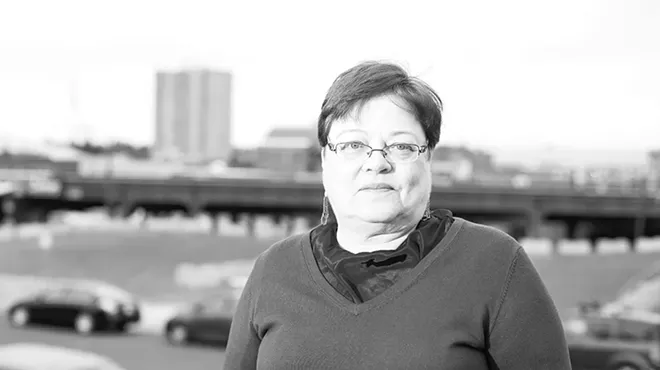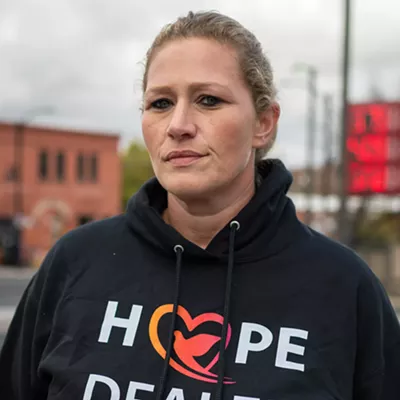Mental illness is not one person's problem. It touches our friends, family, neighbors, classmates and colleagues. Fixing the cracks in the mental health system will require the efforts of everyone. Not just politicians and police, but teachers, parents, social workers, lawyers, doctors, judges and jailers. We know the problems. Who's going to be part of the solution?
How to identify symptoms of mental illnesses
Nearly one in five Americans experience mental illness in any given year. Of those, about 19 percent suffer from anxiety disorders (the most common mental illness), followed by major depression (6.8 percent), bipolar disorder (2.8 percent), eating disorders (2.1 percent) and schizophrenia (0.45 percent). Here's how you can identify symptoms of these mental health problems.
• Anxiety disorders: For most people, a little anxiety is a normal and healthy reaction to stressful situations. For others, severe anxiety is debilitating. Types of anxiety disorders include generalized anxiety disorder (GAD), obsessive-compulsive disorder (OCD), panic disorder, post-traumatic stress disorder (PTSD), social anxiety disorder and specific phobias. Common symptoms are unreasonable and excessive fear, worry and dread; phobic or obsessive compulsive behavior; rapid heartbeat; hyperventilation; nausea; restlessness.
• Depression: Unlike the occasional "blues," a major depressive disorder lasts for at least two weeks and disrupts a person's everyday life, relationships and activities. Common symptoms are unusual sadness, loss of interest in previously enjoyable activities, low energy, suicidal thoughts, difficulty sleeping, loss of interest in or excessive eating.
• Bipolar: Previously known as "manic depressive disorder," bipolar disorder is a type of mood disorder, like depression. Bipolar is characterized by severe mood swings. People with bipolar disorder can sometimes experience psychosis — meaning they lose touch with reality — during manic or depressive episodes. Common symptoms during a manic episode include high energy, increased activity, extreme happiness, little sleep, rapid speech and grandiose delusions.
• Eating disorders: There are three types of eating disorders recognized by medical professionals: anorexia nervosa, bulimia nervosa and eating disorders not otherwise specified (EDNOS), such as binge eating. People with eating disorders can be underweight, normal weight or overweight. Common symptoms are disordered thoughts revolving around food, excessive vomiting, extreme weakness, low or irregular heartbeat, low body temperature and a body mass index below 16.
• Schizophrenia: A chronic, severe and often misunderstood genetic brain disorder, schizophrenia distorts the way people interpret reality and requires lifelong treatment. Symptoms typically manifest between the ages of 16 and 30. Common symptoms are delusions, hallucinations such as hearing voices, difficulty concentrating, lack of drive, social withdrawal, inappropriate emotional reactions, unclear thinking and psychosis.
— DEANNA PAN
How the system works
In Washington, state and federal mental health care funding is distributed through Regional Support Networks, administrative agencies tasked with distributing money to local service providers. The RSN covering Eastern Washington serves eight counties, including Spokane, where Frontier Behavioral Health (838-4651) is the largest mental health service provider. Gov. Jay Inslee has said he wants to better integrate mental health care, primary care and substance abuse.
In Idaho, the state contracts with local organizations to provide mental health care and has "regional behavioral health boards" to advise state agencies on how to better provide mental health and substance abuse treatment in each area of the state. For those on Medicaid, the state recently began contracting with a national company called Optum to manage that program. In Coeur d'Alene, Kootenai Behavioral Health Center offers stabilization for youth and adults in crisis and chemical dependency treatment. Reach them at (208) 625-4800.
— HEIDI GROOVER
Know your employee rights
The Americans with Disabilities Act provides a number of protections for workers with mental health issues. All government agencies and private companies with 15 or more employees must follow guidelines on mental health questioning and provide "reasonable accommodations" for mental health conditions. Here are several scenarios to keep in mind:
• During the interview process: An employer cannot ask about general medical conditions or whether an applicant has a disability. However, an employer can ask about specific job-essential skills, such as whether an applicant can complete tasks on deadline or interact comfortably with customers.
• Disclosing an illness: Employers must only provide accommodations for known disabilities or conditions. When deciding whether to disclose those disabilities or conditions, an individual may consider what kind of support would be most helpful or what accommodations might be put in place. Knowledge of a disability can often help an employer better assign schedules, specific tasks and interpret work performance.
• Making "reasonable accommodations": Disability Rights Washington (disabilityrightswa.org) defines "reasonable accommodations" as adjustments to work schedule, environment or processing that make a position more accessible to a qualified employee. These accommodations can also be made during the interview process to allow fairer hiring practices. Employers can only refuse if an accommodation would prove an "undue hardship" that is excessively expensive or disruptive, or if an individual would pose a direct threat to the health or safety of the workplace.
• Filing a discrimination complaint: Advocates say workers should first approach their employers to seek out a joint solution or internal correction. If unsuccessful, complaints can be filed with the Washington State Human Rights Commission (hum.wa.gov) or with the Equal Employment Opportunity Commission (eeoc.gov).
— JACOB JONES
How to help someone in jail
Without sufficient treatment or commitment facilities, people with mental health issues often are funneled into the criminal justice system, where they face jail time awaiting court or a competency evaluation. A 2012 study estimated that about 17 percent of county jail inmates suffer from "serious" mental health conditions, and few corrections facilities have the resources to provide specialized care.
Kristina Ray, mental health manager for Spokane County Detention Services, estimates that the local jail houses about 2,000 inmates with mental health issues each year. An increasing number of inmates have arrived showing severe symptoms.
If you have a friend or family member booked into the jail, Ray says you can contact the Mental Health (477-6686) or Medical (477-6812) departments at the jail with any general questions or concerns. Email inquiries can also be sent through the Detention Services website (spokanecounty.org/detentionservices).
"That's a good avenue to check up on your loved ones," she says.
For medications, it helps to notify the Medical department in advance if you know someone plans to turn themselves in for booking. You can also work with Medical to ensure that release forms and physician approvals are properly processed by the jail. Check with the inmate to make sure he or she has completed the necessary forms.
Visiting can be scheduled between 8 am and 3 pm on Monday through Friday at the downtown facility. The Geiger Corrections Center schedules visits on Saturday through Tuesday, based on housing units. Ray recommends visiting when possible to provide support and social interaction.
"Holidays can be a difficult time," she says, encouraging extra visits around significant dates, birthdays or other holidays.
If you cannot visit in person, Ray recommends sending letters or packages with photos, crossword puzzles or other diversions. "Things that help them occupy their time," she says. Letters can also list good times for phone calls, so the inmate can schedule a conversation.
Any additional concerns can be taken to the attention of the inmate's defense attorney, or the ombudsman for the county's Regional Support Network, who oversees mental health care (477-4666).
— JACOB JONES
How to find support if you're feeling suicidal
Identify your allies: Local psychologist Paul Quinnett, who runs a suicide prevention institute, says there are a few questions everyone should ask when they're feeling suicidal — or even just depressed. "Who has been a good listener to me in my life? Who's willing to go out of their way to give me some time? And who do I trust?" he says. "Those three people are the ones who are least likely to say, 'Oh shit, buck up, get over it.' They're more likely to realize you are in trouble."
Lean on those people, Quinnett says, and find new people to trust. Isolation is dangerous, especially for guys. "Men's greatest protective factor is to keep your friends and make new ones," he says.
Remove means of suicide: The most dangerous threat is a firearm, Quinnett says. If you're suicidal, ask a friend to hang onto it. If a family member is suicidal, lock it up. "The 11th commandment of firearm safety: Never loan or sell a weapon to someone thinking about suicide," he says. Pills, household cleaners, even car keys may need to be removed as well. "If you ask them how they might take their own life, they'll usually tell you," he says.
Find a therapist: Not every therapist is trained to deal with suicidal thoughts. But a call to Frontier Behavioral Health (838-4651) can get you a referral to one who is. Quinnett also suggests checking out a website called MoodGYM that can teach people tactics to cope with their depression.
Get physically healthy: "Take your vitamin D, take your Omega-3, practice yoga, meditation, exercise," Quinnett says. "Walk or bike to work." Making your body healthier is a good step to making your mind healthier.
In an emergency: Call the local support line at 1-800-273-8255.
— DANIEL WALTERS
How to find support from people dealing with similar issues
Whether you're the one suffering from mental illness or whether it's a loved one, it can often feel like you're alone. That's what NAMI Spokane — the regional chapter for the National Alliance on Mental Illness — is all about addressing. They not only run numerous education courses about several mental illnesses, they have two different types of monthly support groups. One is for those with mental illness. "It's peer-supported, facilitated by people who have the illnesses themselves," says Ron Anderson, president of NAMI Spokane.
Anderson has a relative with schizophrenia. He relies on the second type of group, where family members struggling with mental illness meet.
"We talk about what we're going through and get help from each other," says Anderson. "We listen to each other's experiences. We learn from each other. Families are just as traumatized by those who get the illnesses themselves."
The conversations each group has are freewheeling and wide-ranging — a facilitator is there, but mostly to keep order and make sure everyone has a time to talk. "We have the tools there to help people understand what they're going through," Anderson says. "It's knowing that you're not alone, it's knowing that things get better usually."
And while the conversations can occasionally dive into some difficult territory, "we always end on a high note," Anderson says. "We're usually laughing by the time we leave."
Go to NAMI Spokane's website, and click on the Support Groups tab for a schedule of when the groups meet. Or check out other support groups through the Spokane Consumer Advocacy Network ([email protected]) or the SEER Support Group through the Community Colleges of Spokane (279-6259).
— DANIEL WALTERS
How to find employment for someone with mental illness
No, finding a job when you have mental illness is not easy.
"Unemployment averages 80 percent for people with mental illnesses," says Ron Anderson, president of the Spokane chapter of the National Alliance on Mental Illness. Part of the challenge, along with all the stigma, is finding a job with the hours and flexibility that fit with a person's skills and abilities. Not everyone can work a full-time job.
Anderson suggests they check out the Evergreen Club. For those already receiving mental health services, the club provides not only a hangout spot, but specifically connects them with part-time and full-time work inside and outside the club.
Otherwise, he suggests the SEER (Supported Education & Employment Enhancing Rehabilitation) program, a set of educational courses offered through the Community Colleges of Spokane. They're not accredited, but they offer a whole host of skills to prepare those with mental illness for the workforce or school. The classes include "Health and Wellness," "Computer Basics and Applications," Transition to College," and "Transition to Work."
"I took one to get me prepared to go back to school and go to college," says Tim McFarland, a 36-year-old diagnosed with bipolar affective disorder. Call their employment specialist at 279-6275.
— DANIEL WALTERS
How to help someone who doesn't want help
Finding mental health care for someone you love will almost assuredly be a confusing bureaucratic process. On top of that, it can sometimes feel like you know the person needs care and they're just not willing.
First, slow down. Frontier Behavioral Health's Esa Lariviere says some people want so badly to help that they end up treating their loved one like a problem to be fixed, worsening tension in the relationship. Separate the person from their symptoms, Lariviere says. "It's so scary to be experiencing symptoms, because there's such a stigma associated with mental health that people lose their identity as a mother or a teacher or whatever, and all of sudden become 'mentally ill,'" she says. Work to find possible avenues of help and present those as options rather than a mandate. Don't try to fight someone else's delusions. You don't have to validate them, but respect what the person is experiencing and, instead of arguing, focus on options for getting care. Always ask if they're considering suicide, and seek help right away if that's the case.
If you're having difficulty understanding or handling a family member's mental illness, consider seeking out other families for support. The local chapter of the National Alliance on Mental Illness offers support groups specifically for families of those living with mental illness. For more information, call 838-5515.
Finally, create boundaries. If you're feeling like the situation requires professional input or the person is a danger to him or herself, seek help. (See our directory on page 45 for different types of resources.)
— HEIDI GROOVER
How to commit someone who is a danger to themselves or others
The basic threshold for someone to be committed to a hospital for mental health care against their will (known as involuntary commitment) is that they must be either "gravely disabled" or have a mental health issue that's creating an imminent risk to themselves or others. In those situations, designated mental health professionals working for the county will respond to assess the person, determine whether there's a less restrictive option to get the person care, and if not, begin the civil court process for involuntary commitment. A person can be hospitalized involuntarily for up to 72 hours. To begin this process, call Frontier's First Call for Help hotline at 838-4428. In Idaho, police officers are responsible for taking those who are a threat into protective custody and placing them at a treatment center. Call 211 to be directed to your local police department. If you are in immediate danger in either state, call 911 instead.
How to find housing
The city of Spokane recently created a new sort of one-stop shop for assessing those in need of housing in the city. During an intake process, various factors including mental illness are considered to give someone a score of how severe their need for housing is. Then, when spots at local agencies open up, people are contacted based on their need. The availability of housing depends on the level of support needed. In some cases, social service agencies can help those with mental illness find market-rate or subsidized housing; in others they'll look for agency-run housing with support and services on site.
While this is the way basically every single person in need will now seek housing, Chrystal Alderman, who oversees Frontier's homeless outreach team, says already having a case manager from any of the many social service agencies in town will help in navigating the process.
Most homeless outreach teams and shelters offer the intake, but SNAP is the lead agency on the effort. Reach them at 624-4282.
— HEIDI GROOVER
How to use mental health first aid
Are you prepared to respond to a mental health emergency? Like CPR or the Heimlich maneuver, mental health first aid can equip the layperson with useful strategies for dealing with a crisis.
"It's appropriate for anybody interested in or trying to figure out if a family member or friend is dealing with mental health issues," says John Murphy, a certified mental health first aid instructor and programs manager at Passages Peer Support. Rental property managers, police officers, store clerks, teachers — "anybody who might come in contact with somebody with a mental illness," Murphy says — can benefit from taking the eight-hour training course.
So what do you do if an acquaintance or loved one is experiencing a mental health crisis — and how do you tell? Possible warning signs include suicidal thoughts, self-injury, substance abuse, panic attacks, hallucinations or delusions.
"A lot of it is noticing changes in behavior or even thought," says Sydney Lindgren, a certified mental health first aid instructor at Frontier Behavioral Health.
To administer mental health first aid, follow the ALGEE action plan, a mnemonic device, which stands for:
• Assess for risk of suicide or harm;
• Listen nonjudgmentally;
• Give reassurance and information;
• Encourage appropriate professional help; and
• Encourage self-help and other support strategies.
"The basic thing is to always get professional help if you can first," Murphy says. If you're interested in getting trained in mental health first aid, contact him at [email protected] or Frontier Behavioral Health at 458-7453.
— DEANNA PAN
How to help a stranger on the street
You notice a stranger on the sidewalk talking to himself. His behavior is disturbing; he appears to have lost touch with reality. What should you do?
"We really encourage people to do whatever they're comfortable with," says Sydney Lindgren, a certified mental health first aid instructor at Frontier Behavioral Health. "I've been in situations where as a nonprofessional in the community outside of work hours, I've encountered someone not in a crisis, but definitely in a state where they could have used a lending hand and a kind ear, and it was up to me whether I felt safe to approach them or not."
Follow the ALGEE protocol (See "How to use mental health first aid," page 34.) If you feel safe, start by introducing yourself. Use "I" statements and ask if he needs any help. Call the professionals at First Call for Help at 838-4428, or in an immediate emergency, dial 911.
— DEANNA PAN
How to get into mental health court
Many jurisdictions now recognize the role mental health can play in an individual's likelihood to self-medicate through drug use or act out in unlawful ways. Research consistently shows that people with mental health issues are at higher risk of being victims than perpetrators, but many still end up in the criminal justice system.
Both Spokane and Kootenai counties have established Mental Health Court programs that bring together attorneys, judges and advocates to provide treatment and recovery goals instead of jail time. Deputy prosecutor Gretchen Verhoef, who previously worked with the Spokane County District Court program, says many cases can be resolved through this new track.
"It can be a long process to recovery or getting a person stabilized," she says. "The [Mental Health] court is a lot more understanding and a lot more sensitive to those issues."
Misdemeanor charges in District or Spokane Municipal courts can be transferred to the Mental Health Court for a treatment-based diversion or for probation monitoring post-conviction. The program has a capacity of 500 defendants with a commitment period of one to two years.
Verhoef recommends consulting with your defense attorney about whether you meet the criteria for the program. Participants must have a diagnosed mental health issue as well as a criminal history free of serious violent offenses. A defense attorney can submit a referral and medical release form to the court for consideration.
Most eligible referrals should be accepted, Verhoef says. A team then establishes a treatment regimen and court appearances to oversee recovery. A similar program in Kootenai County has a capacity of 40 defendants. A small pilot program for Spokane felony charges started earlier this year, but is currently full.
"You need to speak to your attorney about it," Verhoef says, "and determine if it's the right thing for you."
— JACOB JONES
How to talk sensitively about mental illness
Our language is a reflection of our attitudes and beliefs. Too often, the labels we use to describe other people who are different than we are stigmatizes them and perpetuates harmful stereotypes and discrimination. This is especially true for people living with a mental illness, says Sydney Lindgren, a certified mental health first aid instructor at Frontier Behavioral Health.
"A lot of times people will use terms that we see in pop culture and media, and sometimes even in newsprint — things like 'That person was schizophrenic; that person was crazy; they're mental,'" Lindgren says. "Now we're starting to realize how negatively those [words] are impacting those people who have those diagnoses."
If we want to end the stigma surrounding mental illness, we need to start by changing the way we talk about it. For example, when discussing people with mental illness or disabilities, use "people-first language" that emphasizes the individual before the diagnosis. The Washington State Coalition for Mental Health Reporting advises people to avoid using words like "crazed," "lunatic," "deranged," "psycho," "wacko," "brain-dead" or "nuts." The coalition also recommends eliminating stigmatizing phrasing from your vocabulary: "afflicted with," "crippled with," "suffers from," "victim of," "stricken with." This should be obvious, but it bears repeating: Don't make fun of people with mental illness.
Finally, when talking about mental health, always keep in mind that mental illness is treatable. With appropriate help, medication and services, recovery is possible.
"It isn't a death sentence. It isn't something you can't get over. That's what a lot of kids and adults think when they start having mental illness. They think it will ruin their whole life instead of realizing mental health is just a small part of them," Murphy says. "The stigma is still there, but it's less than when I was a kid."
— DEANNA PAN
How to make medication easier
Medication may play a crucial role in stabilizing mood or mental function, but it can often be difficult to manage or maintain. Doctors emphasize that, like antibiotics, it's essential to continue taking prescribed meds after you start feeling better to keep a consistent dosage. Many meds may come with unpleasant side effects, but you can talk to your doctor about mitigating these.
To start, get organized: Most drugstores sell plastic dividers for separating pills out for each day of the week. Store meds in an easy-to-see location and set a regular schedule. You can also ask your doctor about slow-release meds that have to be taken less often.
Strive for consistency: Many medications must build up in a person's system before they become fully effective, while others can be sensitive to missed doses. A doctor can best dial in meds or dosages with a consistent baseline.
Taking medication regularly will offer optimal feedback on whether they work as expected.
Identify and address side effects: Keep track of unusual symptoms and talk to others about what changes they may observe. Talking to doctors, friends and family about side effects can help quickly root out symptoms and will make it easier to mitigate any negative effects.
Overcome reluctance: The National Alliance on Mental Illness recommends approaching medication as a routine, empowering experience. Learn about the meds and potential side effects, but also tie doses into regular tasks, like a morning vitamin routine. Take control of tracking your medication doses and symptoms, or help a family member track their medication goals to give them a strong role in the process. If all else fails, consider putting together a contract or linking privileges to medication.
— JACOB JONES
How to help a friend on social media
You have a friend on Facebook or Twitter who begins posting unusually dark and distressing messages. Your gut tells you something is wrong. What should you do? And among teenagers and adolescents, how do you tell the difference between normal pubescent angst and serious cries for help?
The most important thing you can do is to get involved, says John Murphy, a certified mental health first aid instructor and programs manager at Passages Peer Support.
"Don't be afraid to call somebody and get some help for these people, because that's what often happens — people wait until it's too late," he continues. "Call somebody immediately. Call their family. Call the school. Notify somebody that something's not right with them. ... If you're friends, you ask them if they're alright."
Sometimes all your friend may need is someone to talk to or a sympathetic ear.
— DEANNA PAN
How to lobby your local lawmakers
Inspired by what you've read in the Inlander throughout our State of Mind series? Look up your local lawmakers at app.leg.wa.gov/districtfinder, write them letters or book an appointment at their district offices — and tell them why investing in your state's mental health system is important to you.
Just make sure your pitch is short.
"Chances are pretty good [you're] not going to get over about 15 minutes," says Sandi Ando, NAMI Washington's public policy chair. "You want it short enough that they'll either read it or listen to the whole thing and get what you want."
Every year, through her position at NAMI, Ando advocates for mental health reform in Olympia. When writing to or speaking with lawmakers, she recommends following this template:
Introduce yourself: In one sentence, tell your legislators who you are and why they should listen to you. "A lot of time, they won't talk to people who aren't their constituents," Ando says.
Tell your story: If you've experienced a mental health crisis, you could probably talk for hours about what you and your family went through. Instead, focus on honing your story and message in six to eight sentences. Briefly describe your personal experience and why this issue matters to you and others.
Then tell your legislator exactly what you want, whether it's increasing mental health funding or changing the standard for involuntary commitment. "State the problem," Ando says. "If you don't have a strong message up front, they won't understand what you're asking about."
Tailor your message to your lawmakers' politics. "With some of the more conservative members, they listen more carefully if you give them something that says how this is going to save money for that state," Ando says. "They also want to hear how this is going to help this person become a fulfilled and contributing member of society."
Wrap it up: Emphasize again what action you'd like your legislators to take, and answer any of their questions. Finally, having a clear and coordinated message is also important. Visit the NAMI Washington website at namiwa.org to learn more about the issues and legislation supported by mental health advocates.
— DEANNA PAN





























